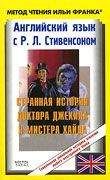Ли Чайлд - "Этаж смерти" with W_cat

Помощь проекту
"Этаж смерти" with W_cat читать книгу онлайн
[206] “Do you feel bitter?” he said. “Let down?”
[207] “No,” I said. “Should I?”
[208] “No problems at all?” he asked. Like there had to be something.
[209] I felt like I had to give him some kind of an answer. But I couldn’t think of anything. I had been in the service since the day I was born. Now I was out. Being out felt great. Felt like freedom. Like all my life I’d had a slight headache. Not noticing until it was gone. My only problem was making a living. How to make a living without giving up the freedom was not an easy trick. I hadn’t earned a cent in six months. That was my only problem. But I wasn’t about to tell Finlay that. He’d see it as a motive. He’d think I had decided to bankroll my vagrant lifestyle by robbing people. At warehouses. And then killing them.
[210] “I guess the transition is hard to manage,” I said. “Especially since I had the life as a kid, too.”
[211] Finlay nodded. Considered my answer.
[212] “Why you in particular?” he said. “Did you volunteer to muster out?”
[213] “I never volunteer for anything,” I said. “Soldier’s basic rule.”
[214] Another silence.
[215] “Did you specialize?” he asked. “In the service?”
[216] “General duties, initially,” I said. “That’s the system. Then I handled secrets security for five years. Then the last six years, I handled something else.”
[217] Let him ask.
[218] “What was that?” he asked.
[219] “Homicide investigation,” I said.
[220] Finlay leaned right back. Grunted. Did the steepled fingers thing again. He gazed at me and exhaled. Sat forward. Pointed a finger at me.
[221] “Right,” he said. “I’m going to check you out. We’ve got your prints. Those should be on file with the army. We’ll get your service record. All of it. All the details. We’ll check with the bus company. Check your ticket. Find the driver, find the passengers. If what you say is right, we’ll know soon enough. And if it’s true, it may let you off the hook. Obviously, certain details of timing and methodology will determine the matter. Those details are as yet unclear.”
[222] He paused and exhaled again. Looked right at me.
[223] “In the meantime, I’m a cautious man,” he said. “On the face of it, you look bad. A drifter. A vagrant. No address, no history. Your story may be bullshit. You may be a fugitive. You may have been murdering people left and right in a dozen states. I just don’t know. I can’t be expected to give you the benefit of the doubt. Right now, why should I even have any doubt? You stay locked up until we know for sure, OK?”
[224] It was what I had expected. It was exactly what I would have said. But I just looked at him and shook my head.
[225] “You’re a cautious guy?” I said. “That’s for damn sure.”
[226] He looked back at me.
[227] “If I’m wrong, I’ll buy you lunch on Monday,” he said. “At Eno’s place, to make up for today.”
[228] I shook my head again.
[229] “I’m not looking for a buddy down here,” I said.
[230] Finlay just shrugged. Clicked off the tape recorder. Rewound. Took out the tape. Wrote on it. He buzzed the intercom on the big rosewood desk. Asked Baker to come back in. I waited. It was still cold. But I had finally dried out. The rain had fallen out of the Georgia sky and had soaked into me. Now it had been sucked out again by the dried office air. A dehumidifier had sucked it out and piped it away.
[231] Baker knocked and entered. Finlay told him to escort me to the cells. Then he nodded to me. It was a nod which said: if you turn out not to be the guy, remember I was just doing my job. I nodded back. Mine was a nod which said: while you’re covering your ass, there’s a killer running about outside.
[232] THE CELL BLOCK WAS REALLY JUST A WIDE ALCOVE OFF THE main open-plan squad room. It was divided into three separate cells with vertical bars. The front wall was all bars. A gate section hinged into each cell. The metalwork had a fabulous dull glitter. Looked like titanium. Each cell was carpeted. But totally empty. No furniture or bed ledge. Just a high-budget version of the old-fashioned holding pens you used to see.
[233] “No overnight accommodation here?” I asked Baker.
[234] “No way,” he replied. “You’ll be moved to the state facility later. Bus comes by at six. Bus brings you back Monday.”
[235] He clanged the gate shut and turned his key. I heard bolts socket home all around the rim. Electric. I took the newspaper out of my pocket. Took off my coat and rolled it up. Lay flat on the floor and crammed the coat under my head.
[236] Now I was truly pissed off. I was going to prison for the weekend. I wasn’t staying in a station house cell. Not that I had any other plans. But I knew about civilian prisons. A lot of army deserters end up in civilian prisons. For one thing or another. The system notifies the army. Military policeman gets sent to bring them back. So I’d seen civilian prisons. They didn’t make me wild with enthusiasm. I lay angrily listening to the hum of the squad room. Phones rang. Keyboards pattered. The tempo rose and fell. Officers moved about, talking low.
[237] Then I tried to finish reading the borrowed newspaper. It was full of shit about the president and his campaign to get himself elected again for a second term. The old guy was down in Pensacola on the Gulf Coast. He was aiming to get the budget balanced before his grandchildren’s hair turned white. He was cutting things like a guy with a machete blasting his way through the jungle. Down in Pensacola, he was sticking it to the Coast Guard. They’d been running an initiative for the last twelve months. They’d been out in force like a curved shield off Florida’s coast every day for a year, boarding and searching all the marine traffic they didn’t like the smell of. It had been announced with an enormous fanfare. And it had been successful beyond their wildest dreams. They’d seized all kinds of stuff. Drugs, mostly, but guns as well, illegal migrants from Haiti and Cuba. The interdiction was reducing crime all over the States months later and thousands of miles further down the line. A big success.
So it was being abandoned. It was very expensive to run. The Coast Guard’s budget was into serious deficit. The president said he couldn’t increase it. In fact, he’d have to cut it. The economy was in a mess. Nothing else he could do. So the interdiction initiative would be canceled in seven days’ time. The president was trying to come across like a statesman. Law enforcement big shots were angry, because they figured prevention was better than cure. Washington insiders were happy, because fifty cents spent on beat cops was much more visible than two bucks spent out on the ocean two thousand miles away from the voters. The arguments flew back and forth. And in the smudgy photographs, the president was just beaming away like a statesman saying there was nothing he could do. I stopped reading, because it was just making me angrier.
[238] To calm down, I ran music through my head. The chorus in “Smokestack Lightning.” The Howling Wolf version puts a wonderful strangled cry on the end of the first line. They say you need to ride the rails for a while to understand the traveling blues. They’re wrong. To understand the traveling blues you need to be locked down somewhere. In a cell. Or in the army. Someplace where you’re caged. Someplace where smokestack lightning looks like a faraway beacon of impossible freedom. I lay there with my coat as a pillow and listened to the music in my head. At the end of the third chorus, I fell asleep.
[239] I WOKE UP AGAIN WHEN BAKER STARTED KICKING THE BARS. They made a dull ringing sound. Like a funeral bell. Baker stood there with Finlay. They looked down at me. I stayed on the floor. I was comfortable down there.
[240] “Where did you say you were at midnight last night?” Finlay asked me.
[241] “Getting on the bus in Tampa,” I said.
[242] “We’ve got a new witness,” Finlay said. “He saw you at the warehouse facility. Last night. Hanging around. At midnight.”
[243] “Total crap, Finlay,” I said. “Impossible. Who the hell is this new witness?”
[244] “The witness is Chief Morrison,” Finlay said. “The chief of police. He says he was sure he had seen you before. Now he has remembered where.”
3
[245] THEY TOOK ME BACK TO THE ROSEWOOD OFFICE IN HANDCUFFS. Finlay sat at the big desk, in front of the flags, under the old clock. Baker set a chair at the end of the desk. I sat opposite Finlay. He took out the tape machine. Dragged out the cords. Positioned the microphone between us. Tested it with his fingernail. Rolled the tape back. Ready.
[246] “The last twenty-four hours, Reacher,” he said. “In detail.”
[247] The two policemen were crackling with repressed excitement. A weak case had suddenly grown strong. The thrill of winning was beginning to grip them. I recognized the signs.
[248] “I was in Tampa last night,” I said. “Got on the bus at midnight. Witnesses can confirm that. I got off the bus at eight this morning where the county road meets the highway. If Chief Morrison says he saw me at midnight, he’s mistaken. At that time I was about four hundred miles away. I can’t add anything more. Check it out.”
[249] Finlay stared at me. Then he nodded to Baker who opened a buff file.
[250] “Victim is unidentified,” Baker said. “No ID. No wallet. No distinguishing marks. White male, maybe forty, very tall, shaved head. Body was found up there at eight this morning on the ground against the perimeter fence close to the main gate. It was partially covered with cardboard. We were able to fingerprint the body. Negative result. No match anywhere in the database.”
[251] “Who was he, Reacher?” Finlay asked.
[252] Baker waited for some sort of reaction from me. He didn’t get one. I just sat there and listened to the quiet tick of the old clock. The hands crawled around to two thirty. I didn’t speak. Baker riffed through the file and selected another sheet. He glanced up again and continued.
[253] “Victim received two shots to the head,” he said. “Probably a small-caliber automatic with a silencer. First shot was close range, left temple, second was a contact shot behind the left ear. Obviously soft-nosed slugs, because the exit wounds removed the guy’s face. Rain has washed away the powder deposits but the burn patterns suggest the silencer. Fatal shot must have been the first. No bullets remained in the skull. No shell cases were found.”
[254] “Where’s the gun, Reacher?” Finlay said.
[255] I looked at him and made a face. Didn’t speak.
[256] “Victim died between eleven thirty and one o’clock last night,” Baker said. “Body wasn’t there at eleven thirty when the evening gateman went off duty. He confirms that. It was found when the day man came in to open the gate. About eight o’clock. He saw you leaving the scene and phoned it in.”
[257] “Who was he, Reacher?” Finlay said again.
[258] I ignored him and looked at Baker.
[259] “Why before one o’clock?” I asked him.
[260] “The heavy rain last night began at one o’clock,” he said. “The pavement underneath the body was bone dry. So, the body was on the ground before one o’clock when the rain started. Medical opinion is he was shot at midnight.”
[261] I nodded. Smiled at them. The time of death was going to let me out.
[262] “Tell us what happened next,” Finlay said, quietly.
[263] I shrugged at him.
[264] “You tell me,” I said. “I wasn’t there. I was in Tampa at midnight.”
[265] Baker leaned forward and pulled another sheet out of the file.
[266] “What happened next is you got weird,” he said. “You went crazy.”
[267] I shook my head at him.
[268] “I wasn’t there at midnight,” I said again. “I was getting on the bus in Tampa. Nothing too weird about that.”
[269] The two cops didn’t react. They looked pretty grim.
[270] “Your first shot killed him,” Baker said. “Then you shot him again, and then you went berserk and kicked the shit out of the body. There are massive postmortem injuries. You shot him and then you tried to kick him apart. You kicked that corpse all over the damn place. You were in a frenzy. Then you calmed down and tried to hide the body under the cardboard.”
[271] I was quiet for a long moment.
[272] “Postmortem injuries?” I said.
[273] Baker nodded.
[274] “Like a frenzy,” he said. “The guy looks like he was run over by a truck. Just about every bone is smashed. But the doctor says it happened after the guy was already dead. You’re a weird guy, Reacher, that’s for damn sure.”
[275] “Who was he?” Finlay asked for the third time.
[276] I just looked at him. Baker was right. It had got weird. Very weird. Homicidal frenzy is bad enough. But postmortem frenzy is worse. I’d come across it a few times. Didn’t want to come across it anymore. But the way they’d described it to me, it didn’t make any sense.

























